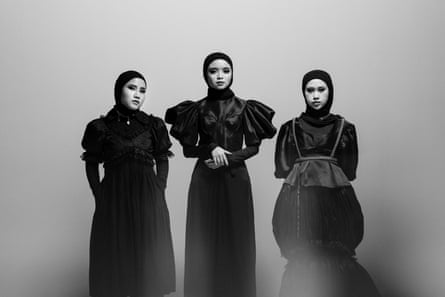When the members of all-female Indonesian metal trio Voice of Baceprot finished middle school in their teens, they were at a crossroads. Their parents wanted them to fall in line: the pressure was on to enter an arranged marriage and live traditional lives. “It was really hard to just say no to our parents when they told us to get married,” the band’s singer/guitarist Marsya (full name Firda Marsya Kurnia) remembers today. “But we are happy because of music. It lets us be the real versions of ourselves. Heavy metal gave us the courage to say: ‘No! I will play metal until I can’t any more!’”
Almost a decade later, that’s become the greatest decision of their lives: Voice of Baceprot (pronounced “bah-che-prot”) are one of metal’s biggest buzz bands. Although their debut album Retas doesn’t drop until July, they’ve already accrued viral fame, performances on national TV and slots at major metal festivals since forming as schoolgirls in 2014. Singles like God Allow Me (Please) to Play Music indulge 90s alt-metal nostalgia with their sturdy riffing and obviously Rage Against the Machine-inspired funk bass; Marsya’s lyrics about feminism, sexual assault and climate change give the songs an acute social conscience. Their success has won their parents over, and RATM guitarist Tom Morello is an outspoken fan, as he once told the band on a Zoom call. “He was great!” Marsya beams. “He was very, very humble and we talked like we were friends.”
Today it’s my turn to talk to the band via video call, and it’s easy to believe they’ll stick together for life. Although 23-year-old Marsya is by far the most verbose of the bunch, she, 23-year-old drummer Sitti (Euis Siti Aisyah) and 21-year-old bassist Widi Rahmawati are clearly best friends. They’re infectiously giggly together and share in-jokes in their native Sundanese. They’re a united front, with Marsya more frequently using “we” than “I”, and the three are now also roommates in the Indonesian capital of Jakarta – a far cry from where they were raised in the remote village of Singajaya, West Java.
“We grew up as farmers’ daughters, with all the cows and sheep,” Marsya laughs. “It’s very far from the city, but we loved the environment there and the fresh air.”
Voice of Baceprot describe their school days as “boring” (the first original song they released, 2018’s School Revolution, is about the failings of the education system). However, things got interesting when Marsya and Rahmawati discovered System of a Down on one of their teacher’s computers. “We fell in love!” Marsya says. “It was an adrenaline rush!”
That teacher, Ahba Erza, helped the pair learn guitar and bass, then they enlisted Sitti as their drummer. “She had a bad habit in class of hitting the table,” Marsya explains. Erza is still a guiding light for the band, video-calling them every day.
Indonesia has the most Muslims of any nation in the world, with approximately 209m people (87% of the population) there following Islam as of 2017. Although much of the country is moderate and there’s a fertile metal scene, West Java is a more conservative region. After Voice of Baceprot began playing in public, the power to one of their gigs was cut off, because Sitti’s drums were deemed too loud. Marsya was once attacked, a rock thrown at her head. Attached to it was a note telling her to stop playing “devil’s music”.
“It was truly scary,” she remembers, “but I loved music, so I didn’t care.” The band are still proud Muslims despite the bullying. “It’s not about the religion; it’s about the people around us,” Marsya says, she and her bandmates wearing hijabs during our call.
Erza started uploading the teenagers’ takes on Metallica, System of a Down and Red Hot Chili Peppers songs to YouTube. The covers became viral hits, despite the musicians behind them not having phones or internet access at the time. Today, the band have a thriving TikTok presence and 300,000 YouTube subscribers, with God Allow Me (Please) to Play Music boasting more than four million views. That online fame has translated into the real world: Voice of Baceprot played at Germany’s 75,000-capacity Wacken Open Air festival in 2022 and are about to tour the US.
after newsletter promotion

Marsya, Sitti and Rahmawati are using their platform to encourage change. “We care about the world around us,” explains Marsya. “Music is the most honest means of self-expression and has enormous power to change the environment.”
Their 2021 single (Not) Public Property decries abuse, was released on International Women’s Day and marked the start of a campaign to raise money for victims of sexual violence. “Indonesia seems to mirror the unfortunate reality faced by women and children in different parts of the world – they continue to suffer from violence, often hidden from public knowledge,” she says. “We remain committed to creating safe spaces and fighting against violence and sexual harassment wherever we are, including through the songs we put out.”
Beyond Retas (named after the Sundanese word for “breaking”, because the band feel it will be a long-awaited breakthrough) and the US tour, Voice of Baceprot don’t have any commercial goals. “The most important thing is that we stay solid as a band and continue to love one another,” Sitti says. However, changing the world along the way would be a wonderful bonus. “We just want the Earth to be a better place to live,” Marsya states. “For now, tomorrow and forever.”
-
Retas is out now on 12Wired.
